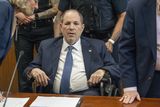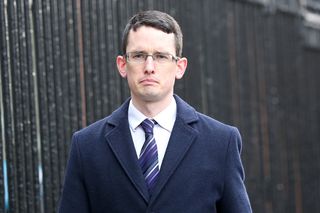'Aloof? I was just scared' - Aidan Gillen on finding love, dealing with his father's illness and why he prefers Kerry to Hollywood
Aidan Gillen speaks to Dónal Lynch about finding love again, dealing with his father's illness during the filming of The Wire, and why he prefers camping in Kerry to the high life in Hollywood.
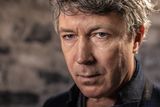
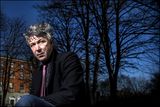




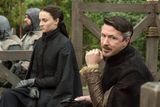
Like a lot of actors, Aidan Gillen has sometimes harboured fantasies of the show not going on. An asteroid might hit the theatre or land on the set, he mused, "and nobody could blame you, it wouldn't be anyone's fault".
And, yet, as the pandemic called a halt to his latest play, The Faith Healer, at the Abbey, Gillen found that the enforced period of inactivity brought mixed emotions.
"It was a strange time. Days melted into each other, I was never sure what time it was and I had some very strange sleep patterns. But there were good things too. I also connected with people I hadn't seen in a while. I took long walks with old friends and spent a lot of time with my kids and did some cooking. I also spent time thinking and worrying about the future and what is happening in the world, so I wouldn't consider it a holiday either."
Actors should be considered essential workers, he says, and it's probably true that his own substantial body of work helped many of us through the long nights of lockdown. More than any other Irish actor, he's been a seam of talent running through the golden age of television, with unforgettable performances in series such as The Wire, Peaky Blinders and Game of Thrones, but, unlike most of his famous peers, he has also periodically returned to the stage and mixed in low-budget films.
Aidan Gillen says of living in LA, 'if you are the type of person who likes real-world stuff, it's not for you'. Photo: David Conachy
"I always needed to earn a living, I've got kids," he begins. "But I don't feel like I've ever followed the money. The original building blocks of my career were always things that were a bit offbeat. I didn't take them on because they were going to get me anywhere but because they were original and difficult and exciting roles and projects."
While there was never any doubting his incredible talent, Gillen, as a personality, was somewhat less warmly perceived. A legion of previous interviewers had described him as everything from reluctant to speak at all, to slightly awkward, and a bit distant. And yet the real Aidan - on the other side of a Zoom call - is so far from any of these descriptions that it's almost hard to credit them. While most actors are almost obsessional about their careers, he freely speaks about all aspects of his life.
Even at the end of a long day of filming - he's currently working on a gritty new RTÉ crime series, Kin - he has a touch of the wryness of his greatest performances and enjoys a glass of red wine as we chat.
He's not sure if the journalists got it wrong or if he's mellowed with age, he says. "I think they had the wrong impression of me but I changed over time as well. I think at the start I was just scared. I was shy. I hope people had the wrong idea of me. I didn't want them to feel they knew me either. That was part of it. I didn't have a technique for talking to strangers in any kind of coherent way that didn't come across as aloof. It wasn't because I really was that way, it was just that my attitude was 'I'm an actor and I play roles, why do I have to sit here and talk about it?'"
It was already discernible, to those who were paying attention, that Gillen had begun to season his signature brooding with a pinch of self-mockery. In his 2017 film Pickups, which he co-wrote, his character - also called Aidan - is constantly being recognised as "that fella off the TV" by people who then won't believe it's really him. "I thought he'd be taller," they say, as he pretends not to hear them. The film is a portrait of a man who is wearily resigned to the fact that he is public property, but at the same time is astute enough to know he'd miss it if it were gone.
"We did want to have a laugh about what mid-level public recognition gives you, but also about the lonesomeness that pursuing a screen-acting career over many years can bring - watch Lost in Translation for the perfect realisation of that," he says.
Gillen (centre) in 'Queer As Folk'
"And it is funny, people think you look like the guy, but are always telling you he is younger and better looking and maybe that he's not that good either. I do love this life, by the way, but it's nuts."
Gillen's groundedness goes back to his upbringing as the youngest of six kids in Drumcondra, in what he described as a "happy, secure environment". He admired his mother, Patricia, who worked as a nurse into her 70s, and he was close to his father, Denis, who worked installing stone cladding and doing building extensions around Cabra and Walkinstown. Both parents were "understandably concerned" when two of their children decided to become actors - Aidan's sister, Patricia Murphy, is also an actress - "but there was nothing they could do about it".
Gillen was in the National Youth Theatre at 14 and never considered anything other than acting. "I didn't have any other skills, I just about had a secondary school education and a Leaving Cert. But I knew one thing: I didn't want to work in an office."
He moved to London at 19 and slowly built up a reputation as a talented performer in well-received new plays. "There wasn't a ton of work and if you were a young, untrained urchin like me, you had to chase it," he recalls. "I didn't have any other options, but I was always optimistic. The hustle leads to tiny things, but they weren't tiny things to me in any way."
In those years, there was one memorably bad experience. "Very early in my career, I had to wait a long time to get my first pay cheque. I felt bad because when I eventually did do a TV show, I bitched a bit about the person who'd ripped me off, or took a long time to pay me, and I had a bit of residual guilt for that, because I don't know what his situation was."
His first major film was Terry George's Some Mother's Son (1996) but his breakout role in terms of recognition was undoubtedly as the charismatic Lothario in 1999's Queer as Folk. The series, which was set in Manchester, was ground-breaking - the first time gay men had been depicted on British television as three-dimensional characters rather than as mincing punchlines or people with Aids. And yet, looking back at it now, it's hard to imagine that its central storyline - a relationship between a 28-year-old man (Gillen) and a 15-year-old boy (Charlie Hunnam) wouldn't provoke outrage today. "It's a tricky area but no way would it be made now," Gillen says. "At the time, I really saw it as a story of empowerment for the younger guy, regardless of the legality of it. I'm not sure what age the character was in Call Me By Your Name, but that was hugely successful recently, depicting a kind of similar age gap."
Killed off: Aidan Gillen, as Petyr ‘Littlefinger’ Baelish, on the set of ‘Game of Thrones’ with Sophie Turner as Sansa Stark
He had a bit of a blow-up with his other co-star on the series, Craig Kelly. "I thought he was great in it, he did loads of the heavy lifting, [and] was the unsung star of that show. [I was] pretty sure we were literally close to a punch-up on day three [of filming]. Pretty sure he was confusing my acting with reality. I said to the producers, 'can you get rid of him? He's being a c**t and pissing me off.' They said: 'Well, we might have to get rid of you.'"
The series made Gillen a star, something that didn't always sit easily with him. He was asked to do Chris Evans's show TFI Friday and "ran a mile". He recounts a photoshoot where he and Hunnam were supposed to pillow-fight with bikini-clad models. Gillen decided he'd pretend to be asleep on the floor. "It was the first time that I was being stopped on the street or people were calling out names to me -usually the character's name; there was a part of me that liked it, but mainly I didn't and so I ran off to America for a few years and did some obscure, indie, psychological horrors."
He lived in LA for a time but was frustrated by endless meetings about projects that went nowhere and the overall fakeness of the place. "If you are the type of person who likes real-world stuff, it's not for you. I still have an agent there and the network you need, but I kind of like to be able to have that and to live in Kerry."
One of his most famous performances is as the ambitious mayor Tommy Carcetti on The Wire. The series, widely reckoned to be one of the greatest of all time, was a slow burner; it was a while before critics and audiences woke up to its gritty brilliance.
"It was unusual for an American drama to centre around the subjects it did in such a thoughtful way," he says. "All the time I was there, I was almost walking on air. When season four aired, the critical acclaim began. It hadn't been there from the start."
His time filming The Wire coincided with his father's illness and death. "My time in Baltimore, a city I grew to love quickly, and spent a couple of years in, will forever be spliced with my father's last year, mostly because I was there for a lot of it, walking along the waterfront, learning lines and worrying about him, as much as you can."
His parents never treated him any differently as he became famous - he recounts them arriving backstage to plays in London with a cooked steak for him - but it was a little more complicated with friends.
"Maybe if you meet someone you haven't seen for years, yes, it can be a bit hard to get started, especially if they think you're shit. But, as over the years, you have to isolate yourself somewhat when working nights in theatre or days/nights on film/TV, you've already streamlined your social circle. If you build up a career over 30 years, from starting out as a shadow on Wanderly Wagon to a one-liner on something else to eventual lead roles, there's never been a really perceptive shift of vibe or inclination to act starry. Or maybe they do think I'm a total asshole, which no doubt I've been occasionally."
His career seemed to continually build throughout the last 20 years. Game of Thrones, in which he played the scheming Littlefinger, was a televisual supernova, dwarfing everything he had done previously in terms of popularity. The character's death was shot at the beginning of season seven, but didn't air until the finale. He remembers it as "emotional and yes, a trip, but the reason I felt it strongly was nothing to do with the series itself. I just loved my time on that - [co-creators and producers] David Benioff and Dan Weiss gave me a great life for seven years."
Gillen was married to Olivia O'Flanagan from 2001 but they separated in 2005. They have two children, Joe and Berry, who are 19 and 22 respectively.
The toughest part of the breakup, he says "is making sure it works out in the best possible way with the kids… that's it, and where the work is."
For the last few years, Gillen has been in a relationship with musician and actress Camille O'Sullivan. "Camille and me have been together for about six-and-a-half years and she's definitely been a stabilising force in my life," he says. "She's been an inspiration. She's great fun. It was like finding someone who was like me but not totally like me. We understand each other but there are mysteries, too, that you want to unpick."
Last year, Gillen had what looked like a tricky interview moment with Lorraine Kelly when the presenter referred to Camille as his 'fiancée'. "The Lorraine interview wasn't awkward, it was just my genuine reaction," he says. "Camille wasn't my fiancée, and I was still married and I didn't want my kids to be watching TV and think my father is getting married to someone and we don't know about it."
They've no plans to marry. "We both have kids and they're the priority."
Fatherhood brought some contradictions to the daily rhythms of his life, he says. "It slowed things down but it was also as though things sped up in another respect. Days seemed much longer because you were up late at night and early in the morning with babies and then toddlers. But everything happened at a child's pace, and you had to explain things and look at things through a child's psyche. You have to be responsible as a father. I probably don't lay down the law enough."
He lived in Dingle for a few years and his kids went to school there. Though he doesn't have a home there now, he still periodically returns, and sometimes camps there.
"When I lived there I'd fly out of the airport in Kerry, and producers in London were like 'I'm not sure if you should do that. It might tire you out' and I thought 'being around you all the time would tire me out, what gives me my energy is going to Dingle for the weekend' and that was the truth. People in Dingle don't give you any special treatment if you're on the TV, they've no problem treating you like everyone else. I still have friends there but I don't have a home there. I bring a tent and lash it up near Wine Strand - there's never any place to stay in town. I've always liked just getting in the car and going."
He's made a new film, which he can't talk about yet, which was filmed on the empty streets of Dublin during lockdown.
"We didn't try to hide from the fact that there was a pandemic happening so we tried to capture the moment and incorporate it into the story. There was a sense of euphoria to be out doing something."
Gillen is 52 and lately gives the impression of a man much more comfortable in his own skin. He once said that he beats himself up over the fact that he never feels he was as good as he wants to be. But now, mellowed by age, chastened by lockdown, he sounds a hopeful note.
"There's no way I'm as good as I'd like to be yet, but I'm getting there. I've been lucky but I've made my own luck. If you're not out there putting yourself around, you're not going to get lucky or unlucky. I never feel I should have got more out of my career. I'm certainly happy and proud to have got to where I did, but I'm still hopeful there's one or two great roles for me out there."
Pictures by David Conachy
Three of the best Aidan Gillen performances
Tommy Carcetti in 'The Wire' (2005)
Aidan as Tommy Carcetti in The Wire
The Wire, Gillen once said, "went beyond mere entertainment... It dealt with issues that no other shows would be interested in dealing with. It didn't compromise in any areas." While most shows of the era -the mid-2000s - were highly stylised, the plot lines of dialogue in The Wire paralleled real life, in that they were fragmented and filled with gaps, and Gillen delivered the meaningful silences with the same skill as the killer lines. The show held up an uncomfortable mirror to American society, and Gillen's performance as Tommy Carcetti, a politician whose conscience slowly catches up with his essentially self-serving nature, was one of the highlights.
Aidan in 'Treacle Jr' (2010)
One of the delights of Gillen's back catalogue is the amount of smaller projects that sailed under the radar. This film, from British director Jamie Thraves (with whom Gillen had also worked on The Low Down - another under-rated gem) contained a towering performance from the Dubliner as a fast-talking and ragged Irishman with learning difficulties. His sunny likeability is a counterpoint to the overall bleakness of the film, and Gillen's subtle, nuanced performance earned warm praise.
Charlie Haughey in 'Charlie' (2015)
Aidan Gillen in Charlie.
Playing the Black Prince of Irish politics, as the series called him, represented a curious challenge for Gillen. Despite the reams that had been written about him, and the scrutiny of his private and public persona, Charlie Haughey remained an essentially 'unknowable' character. As his performance in Game of Thrones proved, Gillen excels at playing shrewd manipulators and, as Haughey, he schemed and seethed in a suitably hideous hairpiece and seemed to summon the spirit and the physicality of the controversial former Taoiseach. It was a performance that won him a Best Actor IFTA in 2015.
Join the Irish Independent WhatsApp channel
Stay up to date with all the latest news













